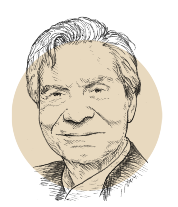France-Amérique: Why are there are several Napoleonic research centers in the U.S., including in Louisiana and Florida?
Alexander Mikaberidze: The French Revolutionary and Napoleonic era (1789-1815) was crucial to the development of the fledgling American republic. Think the Louisiana Purchase in 1803 and the War of 1812. The Napoleonic legend remains widespread in the United States. It sustains the vision of Napoleon as the heroic savior of the revolution and as the omnipotent leader who had expanded France’s culture, arts, and sciences as never before.
You were fascinated by Napoleon from a young age growing up in the former Georgian Soviet Socialist Republic. How do you explain your passion, which is shared worldwide, despite the millions who died because of him?
Holding Napoleon solely responsible for these deaths is incorrect. The wars that ravaged Europe between 1792 and 1815 were not caused by the ambitions of a single man. In my book, I highlight the complexity of causes and factors that contributed to the outbreak of the Napoleonic Wars and that sustained them for almost a quarter of a century. Napoleon shares some responsibility, but he is not the only culprit. As a child, I was mesmerized by Napoleon’s exploits and searched high and low for more books – not an easy task amidst the political and economic turmoil that Georgia experienced after the collapse of the Soviet Union. In many respects, my passion for French history sustained me during those difficult years. I have since devoted 25 years to studying the French Revolution and Napoleon. It is because of this fascination with the emperor of the French that I was able to leave my war-ravaged homeland to pursue a new academic career and achieve the “American Dream.”
Thousands of books have been written on Napoleon. French authors are always positive, while the British, Russians, and Germans are always hostile, but your work seems balanced. Are you neutral?
I doubt any historian can be fully neutral because history is not a set of value-neutral facts. At its core, it is a narrative constructed with facts and interpretations. Thus, every history has a viewpoint. I do not believe in “neutral history” because historians have a responsibility to analyze facts and pass judgement. I did my best to remain objective and point out both the rights and wrongs of what Napoleon and his adversaries had done.
You demonstrate that the Napoleonic Wars could be perceived as the first world war. How did they impact the U.S. beyond the Louisiana Purchase?
In their scale and impact, the Napoleonic Wars dwarfed earlier European conflicts. For 19th-century contemporaries, they came to be known as the “Great War.” However, these conflicts were long considered a particularly European experience. My book seeks to challenge such a Euro-centric approach and showcase the truly global impact of these wars. That includes the impact in North America. The Louisiana Purchase is just one part of the story. The Napoleonic Wars all but destroyed the Spanish Empire, facilitating the expansion of American influence in later years, and they played a crucial role in provoking a conflict between the U.S. and Britain in 1812, the “Second War of American Independence” as some have called it. The War of 1812 was fraught with major consequences. One may point to the Native Americans, who had suffered heavy casualties during the war and were left without any reliable European allies with which to confront American expansion. Or the fact that Canada was not swallowed up by the U.S. and remained under British control. And, of course, U.S. involvement in the wider Napoleonic Wars had a profound impact on domestic politics. Four men who had played important roles during the War of 1812 – James Monroe, John Quincy Adams, Andrew Jackson, and William Henry Harrison – went on to become U.S. presidents.
Has everything been written about Napoleon? After all, we pay little attention to Arabic or Japanese perceptions of Napoleon.
Much has been written about Napoleon but we are far from having said the last word on the subject. Napoleon’s own life continues to be reexamined, as shown by several major biographies published in the last few years. European archives still contain mountains of documents about the Napoleonic era that are waiting to be explored. And there is a dire need for a broader viewpoint that incorporates not just French, British, and German narratives, but widens our understanding to include previously overlooked areas.
At the end of your book, you recall that Napoleon wanted to start a new life in the U.S. after he was defeated for good at Waterloo.
Yes, but the British sent him to the island of Saint Helena instead, probably fearing he would find partisans in America like he did in Elba during his first exile in 1814.
=> The Napoleonic Wars: A Global History by Alexander Mikaberidze, Oxford University Press, 2020.
Interview published in the September 2020 issue of France-Amérique. Subscribe to the magazine.












